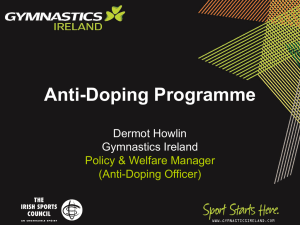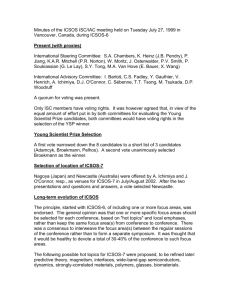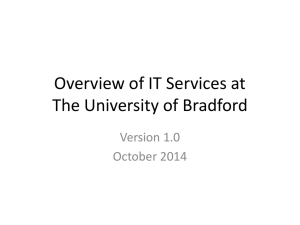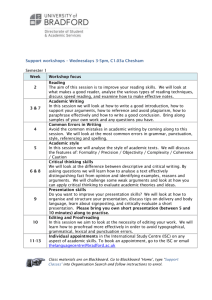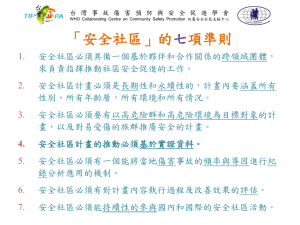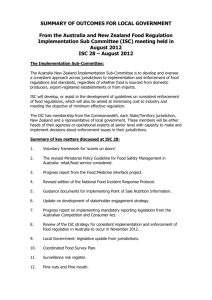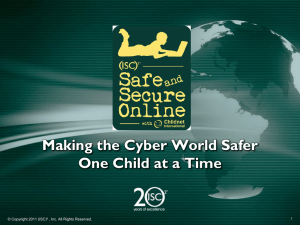Academy of Integrated - College of Science
advertisement
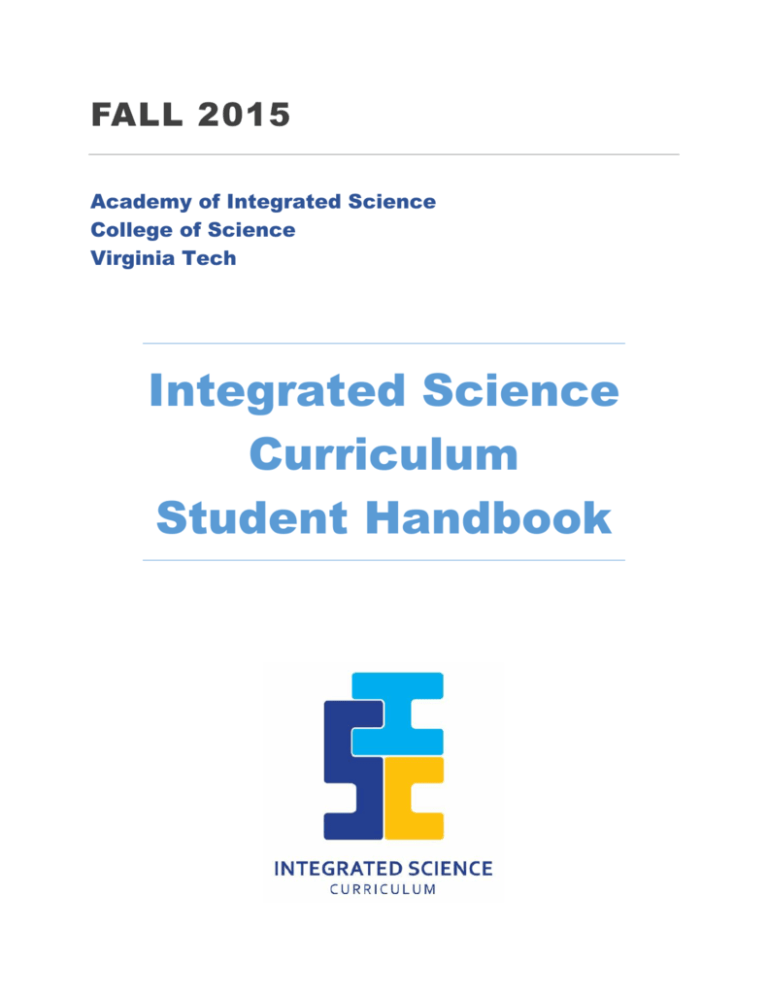
FALL 2015 Academy of Integrated Science College of Science Virginia Tech Integrated Science Curriculum Student Handbook EVERYTHING YOU NEED TO KNOW ABOUT THE INTEGRATED SCIENCE CURRICULUM COMPILED BY NORA SULLIVAN PROGRAM ACADEMIC ADVISOR ACADEMY OF INTEGRATED SCIENCE COLLEGE OF SCIENCE VIRGINIA TECH NORA84@VT.EDU 540-231-2442 WWW.SCIENCE.VT.EDU/AIS/ISC The Integrated Science Curriculum Are you passionate about science and math? Do you seek to understand the big picture as well as all the really cool pieces? Do you want to help solve the world’s most pressing and complex problems through the power of science? Designed for students seeking an in-depth understanding of 21st century science, the Integrated Science Curriculum (ISC) provides a novel, integrated scientific foundation for any degree program in the College of Science. It employs a collaborative, active-learning environment emphasizing teamwork, skills acquisition, independent thought, and creativity. ISC prepares the scientists of the future by having students learn and work as do the most successful scientists of today. Modern science is becoming increasingly interdisciplinary and collaborative in nature. A generation ago, the classic scientific disciplines (biology, chemistry, and physics) could stand independently in a way no longer possible. This is due to the increasingly complex scientific questions that we are asking, questions that require knowledge stemming from all traditional scientific fields. If science majors want to sustain successful careers in a world where the pace of change will only accelerate, they need to be immersed in the new and evolving ways of thinking about and doing science. The ISC presents the foundations of physical, mathematical and life sciences in an integrated, active-learning mode so to produce students with a fundamental understanding of the connections between the traditional sciences. The recent evolution of science, in no small measure driven by the rapid increase in computational power, has brought with it the emergence of important, new scientific fields. The ISC is an excellent entry path for the traditional bachelor’s degrees in the College of Science (biological sciences, biochemistry, chemistry, economics, geosciences, mathematics, physics, psychology, and statistics), as well as for the new degree programs in computational modeling and data analytics, nanoscience, neuroscience, and systems biology. Importantly, the ISC is not just a repackaging of traditional courses. The ISC presents knowledge and techniques from traditional sciences as complements to one another, providing the means to understand large-scale societal problems, including the areas of food, energy, health, water, the environment, and more. The ISC raises broad questions about these complex Earth systems that do not fall into a single scientific box. To address these questions, the ISC introduces and/or increases exposure to advanced scientific topics not typically covered in introductory courses, such as organic chemistry, biochemistry, linear algebra, differential equations, numerical methods, and stochastic processes. Through this approach, ISC students come to understand the interrelationships of the sciences in a way that is not possible with a more conventional course structure. 1 The ISC is structured around the big issues and questions being asked around the world today. These questions require the integration of ideas and methods from all scientific discipline. The basic organizing themes and questions of the ISC include: 1) 2) 3) 4) 5) What is Life? What is Matter? What is Energy? What is Motion? What is Information? Administratively speaking, the ISC is not a degree program. It is a freshman-sophomore course sequence that provides an alternative entry to any major in the College of Science. Students who enroll in the ISC will still choose a major field of study, and in addition to the ISC course and lab will take courses specific to their chosen major. How is the ISC structured? From day one of the ISC, students are weaned off the conventions of the traditional single-discipline classroom and taught to change their field of view from what science is to what science is becoming. Both the ISC course and lab are taught in an active-learning style classroom with an impressive 15:1 studentfaculty ratio. Students are nurtured by top-ranking scientists and professors and develop skills that are often neglected in large, lecture style classrooms. The ISC is a 30 credit, two-year course sequence that covers the fundamentals of college-level chemistry, physics, and biology integrated with each other and with calculus, linear algebra, and statistics. Teamwork, written and oral presentation, and problem-solving are central components throughout the curriculum. In each of the four semesters the ISC course is worth 6 credits and meets every day for seventyfive minutes. In the first year the laboratory course is worth 2 credits and meets twice a week for 2.5 hours. In the second year the laboratory course is worth 1 credit and meets twice per week for seventy-five minutes. Three example course schedules are shown below for ISC students majoring in physics, in biology, and in microbiology. The first two years (when the ISC classes take place) for these majors are shown here. Complete four year schedules are shown at the end of this handbook. 2 Example ISC 2-year course schedules Suggested 2-year schedule for an ISC student working towards a Physics B.S. Freshman Year Fall Spring course credits course ISC 1105 ISC Lecture I 6 ISC 1106 ISC Lecture II ISC 1115 ISC Lab I 2 ISC 1116 ISC Lab II ISC 2984 ISC Math Supplement 1 MATH 1226 Calculus of a Single Variable ENGL 1105 Freshman English 3 MATH 2114 Intro to Linear Algebra PHYS 2325 Physics Freshman Seminar 1 PHYS 2974 Foundations of Physics CLE Area 2 Course 3 PHYS 2326 Physics Freshman Seminar total: 16 total: Sophomore Year ISC 2105 ISC Lecture III 6 ISC 2106 ISC Lecture IV ISC 2115 ISC Lab III 1 ISC 2116 ISC Lab IV MATH 2204 Intro to Multivariable Calculus 3 MATH 3214 Calculus of Several Variables MATH 2214 Intro to Differential Equations 3 PHYS 3355 Intermediate Mechanics PHYS 3324 Modern Physics 4 PHYS 2504 Mathematical Methods total: 17 total: credits 6 2 4 3 3 1 19 6 1 3 3 3 16 Suggested 2-year schedule for an ISC student working towards a Biology B.S. Freshman Year Fall Spring course credits course credits ISC 1105 ISC Lecture I 6 ISC 1106 ISC Lecture II 6 ISC 1115 ISC Lab I 2 ISC 1116 ISC Lab II 2 ISC 2984 ISC Freshman Seminar 1 BIOL 1106 Principles of Biology 3 ENGL 1105 Freshman English 3 ENGL 1106 Freshman English 3 CLE Area Course 3 CLE Area Course 3 total: 15 total: 17 Sophomore Year ISC 2105 ISC Lecture III 6 ISC 2106 ISC Lecture IV 6 ISC 2115 ISC Lab III 1 ISC 2116 ISC Lab IV 1 BIOL 2004 Genetics or BIOL 2804 Ecology 3 BIOL 2804 Ecology or BIOL 2004 Genetics 3 CHEM 2535 Organic Chemistry 3 CHEM 2536 Organic Chemistry 3 CHEM 2545 Organic Chemistry Lab 1 CHEM 2546 Organic Chemistry Lab 1 CLE Area Course 3 total: 14 total: 17 3 course ISC 1105 ISC 1115 ISC 2984 ENGL 1105 ISC 2105 ISC 2115 BIOL 2604 BIOL 2614 CHEM 2535 CHEM 2545 Suggested 2-year schedule for an ISC student working towards a Microbiology B.S. Freshman Year Fall Spring credits course ISC Lecture I 6 ISC 1106 ISC Lecture II ISC Lab I 2 ISC 1116 ISC Lab II ISC Freshman Seminar 1 BIOL 1106 Principles of Biology Freshman English 3 ENGL 1106 Freshman English CLE Area Course 3 CLE Area Course total: 15 total: Sophomore Year ISC Lecture III 6 ISC 2106 ISC Lecture IV ISC Lab III 1 ISC 2116 ISC Lab IV Cell & Molecular Biology or General Microbiology 3 BIOL 2104 BIOL 2004 Genetics General Microbiology Lab 1 CHEM 2536 Organic Chemistry Organic Chemistry 3 CHEM 2546 Organic Chemistry Lab Organic Chemistry Lab 1 CLE Area Course total: 15 total: credits 6 2 3 3 3 17 6 1 3 3 1 3 17 If you would like to compare these ISC schedules with more traditional schedules, you can find the graduation requirements for all Virginia Tech majors here: https://www.registrar.vt.edu/graduation/checksheets/college/index.html After completing the two-year ISC program, students will have earned equivalences in the following courses: BIOL 1105-1106 Principles of Biology BIOL 1115-1116 Principles of Biology Lab CHEM 1035-1036 General Chemistry CHEM 1045-1046 General Chemistry Lab PHYS 2305-2306 Foundations of Physics MATH 1114 Elementary Linear Algebra MATH 1025-1026 Elementary Calculus For majors that require MATH 1225 and 1226, ISC students can earn equivalence for MATH 1225 if they take the ISC Math Supplement in the fall of their freshman year and earn at least a B. They can then take MATH 1226 in the spring of their freshman year. State-of-the-art pedagogy in class and lab The ISC is taught in the modern Student-Centered Active Learning Environment with Upsidedown Pedagogies (SCALE-UP) classroom. This classroom is specifically designed for group work and hands-on assignments and activities. There is no instructor’s lectern and no “front” and “back” to the classroom. Instead, there are round tables that seat 6 to 9 students each where students work 4 and interact in groups. Instructors are free to roam around the classroom answering questions, sending one group to help another, or asking why a certain conclusion was reached. The primary goal of the SCALE-UP classroom is to establish a highly collaborative, hands-on, interactive learning environment. For more information on this state-of-the-art classroom, please visit: http://www.lib.vt.edu/instruct/classrooms/scaleupclass.html https://www.youtube.com/watch?v=pUFud6MoHMo Teamwork, written and oral presentation, and problem-solving are central to the ISC. In the laboratory, data collection is seamlessly integrated with methods of data analysis, discovery and interpretation. ISC aims for laboratory experiences that are closely integrated with lecture material, making them mutually supportive pieces of the learning experience. How to join ISC In order to join the ISC, students must apply using the application found at: http://science.vt.edu/ais/isc/ The application requires an essay of 800 words or less that answers the question: “Why do you want to participate in the integrated science curriculum?”, a copy of your high school transcript, and a recommendation letter from a teacher or guidance counselor. Review of applications begins on June 1st and the deadline for submitting an application is August 1st. All students will be notified of the decision by mid-August. If you have any questions about ISC before or after applying, please feel free to contact us. We are happy to answer any questions you may have and explore whether ISC is a good fit for you. We can also put you in contact with students who have been through the ISC program if you are interested in hearing a student’s perspective. Michel Pleimling Professor of Physics and the ISC Program Leader Academy of Integrated Science College of Science pleim@vt.edu 540-231-2675 Nora Sullivan Academic Program Advisor Academy of Integrated Science College of Science nora84@vt.edu 540-231-2442 5 Charlotte Parks Academic Program Specialist Academy of Integrated Science College of Science crobrtz@vt.edu 540-231-2551 What students are saying about ISC: “What I like most about ISC is that we were able to bypass tedious memorization of biological terms that are already covered by other classes in the biology department. The lectures taught us to combine important ideas from different disciplines to answer interdisciplinary questions, which is an important skill for collaborative efforts in research. I want others to know that the course is more about learning to think and look at questions from novel perspectives, as opposed to the rote memorization that is typically associated with 1000-level coursework.” - Sarah Sam, Cohort II, biology and neuroscience double major “I have benefited from ISC by learning how to incorporate different disciplines together with more ease. The ISC program is very beneficial for those that are interested in research because you learn how to ’speak' the language of different sciences making it a more pleasant and positive experience. Through this program you are able to see how closely all of the sciences and math are linked, which allows you to have a different perspective and see the beauty in science.” - Rachel Ladenburger, Cohort II, biology major “I received one-on-one help from professors and TAs throughout the program through office hours, Skype, review sessions, etc. With a small class size, getting to know classmates and professors was easier. I made many close friends that I could study/do homework with. My professors knew my name, my interests, my strengths and weaknesses, etc. and encouraged and helped me to pursue research and job opportunities. The ISC labs were different than labs for regular classes. I feel like I learned a lot through the labs. The experiments we conducted in ISC lab were similar to experiments that I conducted in a real research lab at the Virginia Tech Carilion Research Institute (VTCRI) last summer. I got a taste of what real research is like. I am glad I finished the program, because I completed a lot of credits I need for my biology major. I also gained lots of useful skills. My technical writing skills improved. Through many group projects I learned how to work with others. I even learned a little bit of MATLAB® coding.” -Emily Meeks, Cohort III, biology major “Deciding to be part of the Integrated Science Curriculum was one of the best decisions I ever made. I knew that the program was suited for me because I liked how the material was not just memorized but you learned why it was that way. I also liked learning the incorporations of the other sciences and math into each other. This made me have appreciation of the others sciences while seeing why I needed to have these other classes although they were not my major. In addition, the lab portion of ISC was conducted in a way of real research whereas many introductory 6 labs are just small exercises rather than a real experiment. The program helped me gain confidence in myself so that I feel prepared in higher level classes, know that I can ask questions no matter how big of classes I am in, and feel prepared as I apply to graduate school. I have felt that my upper level biology courses have been so much easier, and that I have a competitive edge over students who were not in the program. Often the professors will ask if anyone has learned about a certain topic and only the ISC students raise their hands. This shows that the program prepares you more than just taking the introductory courses. The program also allowed me to get to know my professors and peers. I feel that this helped me adjust better to college since I came from a small high school. I think the professional relationships I gained have taught me a lot about science and have been very rewarding while I also have gained friends with similar interests. Another great thing about ISC is that the people in ISC have a wide range of majors, strengths, and backgrounds which means you learn from your peers. I learned just as much from classmates as professors. ISC is a great program for students who always want to learn about science. I have found that many graduate programs think that this style of learning is fascinating and perhaps will make me stand out.” -Kristen Fisher, Cohort II, biology major “The ISC program really helped in more than just an academic way. It was a great way to make an awesome group of friends especially coming into such a large college. You immediately realize you all have something in common and share many interests. It is also a great way to connect with professors in a variety of areas of expertise. The ISC program gave me a new perspective and outlook on how to approach academic material instead of just memorizing a list of flash cards or working out a simple math problem. It taught me how to look at material in different subjects through the lens of another subject. It made me feel like I had my own special place at Virginia Tech and was not grouped into these large classrooms of students like most other freshman. It taught me how important work ethic is and to really pay attention in class because with such a small class size the professors and other students expect you to give 100% all the time. Although I am finished with the ISC program I still keep in touch with many of the students who went through the program with me as well as the students who are still currently enrolled in the program. Finishing the program allowed me to continue to reach out and share my experiences with others and be a source of information or simply a friend to someone just starting a new chapter that I have now been through. Overall if I had to do it over again I would absolutely chose to go through this same program.” -Carrie Ceh, Cohort II, biology major Scheduling of classes All incoming freshman will receive a schedule tailored to their major during summer orientation, after meeting with their advisor. If admitted to the ISC, your schedule will reflect the ISC (6-credit lecture and 2-credit lab) course sequence. Typically, we remove any science or math courses on your schedule that the ISC will cover (i.e., Principles of Biology, General Chemistry, Foundations of Physics, Calculus, etc.). As we prepare your schedule we will be in contact with you via email with questions as to what elective/CLE (Curriculum for Liberal Education) area you want. The goal is to provide admitted ISC students a complete fall schedule before arriving on campus. 7 ISC freshman seminar For incoming freshmen, the first semester of college is full of change. It is very exciting, but can also be challenging and, at times, overwhelming. In order to help ISC freshman have a successful transition from high school to college, and to set them up for a successful college career, we have developed a 1credit freshman seminar open to all ISC students during their first semester. Professor Michel Pleimling teaches this weekly 50-minute seminar and helps students navigate their first semester at Virginia Tech. This seminar also teaches study skills and habits that will help you excel in ISC, in your chosen major and in your career after graduation. Fall 2015 important dates & deadlines Monday August 24, 2015: First day of classes Friday August 28, 2015: Last day to add a class to your schedule Monday September 7, 2015: Labor Day, classes WILL meet Friday October 2, 2015: Last day to drop a class from your schedule Friday October 16, 2015: Fall break, no classes Monday October 19, 2015: Last day to resign from the semester Tuesday October 20, 2015: Opening of web course requests for spring 2016 Tuesday October 27, 2015: Closing of web course requests for spring 2016 Friday November 20, 2015: Last day to request rescheduling of final exams that conflict or constitute three exams in 24 hours* Monday November 23 – Friday November 27, 2015: Thanksgiving break, no classes Wednesday December 9, 2015: Last day of classes Thursday December 10, 2015: Reading day (no classes or exams) Friday December 11, 2015: First day of exams Thursday December 17, 2015: Last day of exams Be Responsible! Know the important dates and deadline affecting your registration at Virginia Tech. You can find the dates listed above, along with any other important dates on the Registrar’s homepage: http://www.registrar.vt.edu Bookmark this page and refer to it often. Make sure to put all important dates on your calendar and refer to it often so that you don’t miss something. 8 *A note about final exams Final exam information can be found on your schedule for the semester. Click on the box to the far right of each course to find the time of the final exam. It is your responsibility to know when and where your final exams will take place. Be sure to check your schedule early to know if you have any conflicting exams or if you have three or more exams within 24 hours. If so, you may be allowed to change one or more exams. See the College of Science website for an explanation of this policy. http://www.science.vt.edu/student/student-final-exam-change.html Please keep in mind that the deadline to request a final exam change is November 20, so you need to pay attention to when your exams will be. We highly recommend you put your final exam schedule on your calendar as soon as your schedule for the semester has been finalized and deal with any exam changes as soon as possible. Please note that an exam change due to travel, business or family plans will not be allowed. Please do not ask. Hokie Spa Hokie Spa is one of the most important resources you will use as a student at Virginia Tech. It is where you will register for classes, see your grades, manage your housing and dining services, manage your student account and more. Some tips and guidelines to using Hokie Spa are outlined here. If you need to use Hokie Spa for things not outlined here, feel free to ask us for advice. Your PID is the part of your email address before the @. For example, if your email is johnsmith@vt.edu, your PID is johnsmith. Your ID number is the 9 numbers on your Hokie ID. Once you are logged into Hokie Spa, you will see a list of links you can click on to perform different tasks. The following list explains most of these links and what you can use them for. Guest Account Access: This is where you can give your parent/guardian permission to access your Hokie Spa account. You can select which parts of Hokie Spa you want them to see. Registration and Schedule: This is where you register for your classes. Before you are allowed to register there are a number of requirements you need to complete. Make sure all the registration requirements listed are green before registration opens or you will not be allowed to register. The “timetable” will open a few days before the course request period opens. When course request period opens you can select all the courses you want to take and for courses with multiple sections you can request the sections that work best for you. A few days later you will get your course request results. You will likely not get exactly what you requested, but please try to make it work. The registration period can be overwhelming, so do not hesitate to reach out to your advisor for help. Grades Menu: This is where your grades are reported. All final grades are uploaded to Hokie Spa a few days after the last day of exams. Please be patient and do not email your professor if your final grade is not available the day after you take your final. 9 Degree Menu: This is where you can view your Degree Audit Reports (DARS). We highly recommend running a “What If” DARS at least once every semester because it will tell you whether or not you are on track to complete you chosen degree program on time. Transcripts and Certifications Menu: This is where you can order copies of your official transcript and view/print unofficial transcripts. Often scholarships and other programs you want to apply for will require that you submit either an official or unofficial transcript. FERPA Disclosure: Please fill this out right away. This is where you can choose who has access to your academic record. General Student Information: This is where all of your basic student information is stored. It shows who your advisor is, whether you are in good academic standing or on probation, whether or not you are registered for a given semester, your classes by credit, what you major is, what you minor is (if you have one), etc. It’s always a good idea to periodically check that all of this information is correct. Student Conduct Notifications: This is where notifications from the Office of Student Conduct are stored. Try to keep this section empty! University Account Information: This is where you (or your parent/guardian) can pay your tuition. Financial Aid Information: This is where you (or your parent/guardian) can review the status of your financial aid award. Housing and Dining Services: This is where you complete your housing contract every year your live on campus, and it is where your room assignment will be posted. This is also where you can select your meal plan. Unless you have been granted an exception, all freshman are required to live on campus and have a meal plan. Personal Information: This is where you can update your address, phone number, email addresses, emergency contact information, etc. Information for New Students: This is a list of quick links you will need to access as a new Virginia Tech student. University Catalog Page: This is where you can view the full course catalog. Student Organizations Menu: This is where you can apply for a fraternity or sorority. It is also where you can reserve rooms if you are in a student club or organization. Pathways Planner: This is where you can plan your pathway to graduation. Fill it out to the best of your ability before you meet with your advisor. This is a great place to monitor your four year plan and check off classes and requirements as you complete them. Your advisor will help you with any questions you have and will help you create the best plan for you. 10 Honor Code Just like all classes and academic activities, the ISC strictly follows the Virginia Tech Honor Code, which embodies a spirit of mutual trust and intellectual honesty that is central to the very nature of the university, and represents the highest possible expression of shared values among the members of the university community. The fundamental principles underlying and reflected in the Honor Code are: 1) That trust in a person is a positive force in making that person worthy of trust, 2) That every student has the right to live in an academic environment that is free from the injustices caused by any form of intellectual dishonesty, and 3) That the honesty and integrity of all members of the university community contribute to its quest for Truth. In order to uphold these beliefs, the Honor Code expressly forbids the following academic violations: 1) Cheating: Cheating includes the actual giving or receiving of any unauthorized aid or assistance or the actual giving or receiving of any unfair advantage on any form or academic work, or attempts thereof. 2) Plagiarism: Plagiarism includes the copying of language, structure, programming, computer code, ideas, and/or thoughts of another and passing off the same as one’s own original work or attempts thereof. 3) Falsification: Falsification includes the statement of any untruth, either verbally or in writing, with respect to any circumstances relevant to one’s academic work, or attempts thereof. Such acts include, but are not limited to, the forgery of official signatures; tampering with official records; fraudulently adding, deleting, or manipulating information on academic work, or fraudulently changing an examination or other academic work after the testing period or due date of the assignment. For more information, questions or concerns regarding the honor code please visit: http://www.honorsystem.vt.edu Textbook Information Currently, students need the following four textbooks for the two-year ISC program: 1) Physics for Scientist and Engineers: A Strategic Approach with Modern Physics (3rd edition), ISBN-13 (9780321740908) by Knight 2) Biology (10th edition), ISBN-13 (9780073377605) by Raven et al. 11 3) Chemical Principles (7th edition), ISBN-13 (9781111580650) by Zumdahl & Decoste 4) Modeling the Dynamics of Life: Calculus and Probability for Life Scientists (3rd Edition), ISBN-13 (9780840064189) by Adler ISC students enrolled in the ISC math supplement will also need: Calculus, 8th Edition, ISBN-13 (9781285741550) by Stewart Who is involved with ISC? The following people keep the ISC program running. Please feel free to contact any of us with questions! Name Ttitle Department Email Phone Administration Charlotte Parks Academic Program Specialist Nora Sullivan Academic Program Advisor Academy of Integrated crobrtz@vt.edu Science Academy of Integrated nora84@vt.edu Science 540-231-2551 540-231-2442 Faculty and Instructors Lara Anderson Assistant Professor Physics lara137@vt.edu Stanca Ciupe Assistant Professor Mathematics stanca@math.vt.edu 540-231-3190 James Gray Assistant Professor Physics grayphys@vt.edu 540-231-0618 Leanna House Assistant Professor Statistics lhouse@vt.edu 540-231-2256 Rick Jensen Professor Biological Sciences rvjensen@vt.edu 540-231-4614 Pavel Kraykivskiy Research Scientist Biological Sciences pavelkr@vt.edu 540-231-6398 Iuliana Lazar Associate Professor Biological Sciences lazar@vt.edu 540-231-5077 Gary Long Associate Dean College of Science long@vt.edu 540-231-7575 Will Mather Assistant Professor Physics wmather@vt.edu 540-231-3332 Erik Nilsen Professor Biological Sciences enilsen@vt.edu 540-231-5674 Michel Pleimling Professor Physics pleim@vt.edu 540-231-2675 Florian Schubot Associate Professor Biological Sciences fschubot@vt.edu 540-231-2393 Tatsu Takeuchi Associate Professor Physics takeuchi@vt.edu 540-231-5333 Craig Tollin Lab Coordinator Academy of Integrated ctollin@vt.edu Science 540-231-6759 John Tyson University Distinguished Professor Biological Sciences 540-231-4662 12 tyson@vt.edu 540-231-0317 What happens if I leave ISC? We don’t want you to leave ISC, but if you decide it is not the right fit for you and you want to leave, you will earn credit for the following courses, depending on how many semesters of ISC you complete. After 1 semester: MATH 1025 It is also possible to get equivalence for PHYS 2305 if you take the thermal physics module for transfer students in the following winter term and successfully pass the written exam. After 2 semesters: MATH 1025 MATH 1026 CHEM 1035 CHEM 1045 PHYS 2305 After 3 semesters: MATH 1025 MATH 1026 CHEM 1035 CHEM 1045 PHYS 2305 CHEM 1036 CHEM 1046 It is also possible to get equivalence for PHYS 2306 if you take the two modules on optics and waves and sound for transfer students in the following winter term and successfully pass the written exams. We hope you join ISC! During its first four years, the ISC has been a great success at Virginia Tech. Students complete the program well prepared to face complex scientific questions that cannot be confined to a single scientific discipline. ISC students know how to think and work like scientists instead of simply being good at absorbing material presented in lecture. If you enjoy approaching science from many different angles and tackling large scale scientific challenges facing society today, the ISC is for you! We hope that you will join us on our journey to change the way students and professors learn and teach science. 13 Complete 4-year ISC schedules Suggested 4-year schedule for an ISC student working towards a Physics B.S. Freshman Year Fall Spring course credits course credits ISC 1105 ISC Lecture I 6 ISC 1106 ISC Lecture II 6 ISC 1115 ISC Lab I 2 ISC 1116 ISC Lab II 2 ISC 2984 ISC Math Supplement 1 MATH 1226 Calculus of a Single Variable 4 ENGL 1105 Freshman English 3 MATH 2114 Intro to Linear Algebra 3 PHYS 2325 Physics Freshman Seminar 1 PHYS 2974 Foundations of Physics 3 CLE Area 2 Course 3 PHYS 2326 Physics Freshman Seminar 1 total: 16 total: 19 Sophomore Year ISC 2105 ISC Lecture III 6 ISC 2106 ISC Lecture IV 6 ISC 2115 ISC Lab III 1 ISC 2116 ISC Lab IV 1 MATH 2204 Intro to Multivariable Calculus 3 MATH 3214 Calculus of Several Variables 3 MATH 2214 Intro to Differential Equations 3 PHYS 3355 Intermediate Mechanics 3 PHYS 3324 Modern Physics 4 PHYS 2504 Mathematical Methods 3 total: 17 total: 16 Junior Year Applied Complex Variables or CS 1044, 1064, 1114, 1124 or ECE 1574 3 MATH 4984 1 MATH 4234 or 4574 Intermediate Lab or AOE 3054, ENGL 1106 Freshman English 3 PHYS 3314 ECE 2204 or 2274, or ESM 3 3444 Operational Methods or Intermediate Electricity & MATH 4564 3 PHYS 3406 3 MATH 4425 Magnetism Intermediate Mechanics or PHYS 3356 3 PHYS 3704 Thermal Physics 3 ESM 3134 or 4114 Intermediate Electricity & PHYS 3405 3 PHYS 4455 Intro to Quantum Mechanics 3 Magnetism or ECE 3104 total: 15 total: 13 Senior Year PHYS 4315 Modern Experimental Physics 2 PHYS 4316 Modern Experimental Physics 2 PHYS 4456 Intro to Quantum Mechanics 3 PHYS 4000+ 3 PHYS 4000+ 3 CLE Area 2 Course 3 CLE Area 3 Course 3 CLE Area 3 Course 3 CLE Area 6 Course 3 CLE Area 7 Course 3 total: 14 total: 14 TOTAL CREDITS: 124 14 course ISC 1105 ISC 1115 ISC 2984 ENGL 1105 ISC 2105 ISC 2115 BIOL 2004 CHEM 2535 CHEM 2545 BIOL 2104 ^BIOL 2304, STAT 3615 Suggested 4-year schedule for an ISC student working towards a Biology B.S. Freshman Year Fall Spring credits course credits ISC Lecture I 6 ISC 1106 ISC Lecture II 6 ISC Lab I 2 ISC 1116 ISC Lab II 2 ISC Freshman Seminar 1 **BIOL 1106 Principles of Biology 3 Freshman English 3 ENGL 1106 Freshman English 3 *CLE Area Course 3 *CLE Area Course 3 total: 15 total: 17 Sophomore Year ISC Lecture III 6 ISC 2106 ISC Lecture IV 6 ISC Lab III 1 ISC 2116 ISC Lab IV 1 Genetics or BIOL 2804 Ecology 3 BIOL 2804 Ecology or BIOL 2004 Genetics 3 Organic Chemistry 3 CHEM 2536 Organic Chemistry 3 Organic Chemistry Lab 1 CHEM 2546 Organic Chemistry Lab 1 *CLE Area Course 3 total: 14 total: 17 Junior Year Cell and Molecular Biology 3 BIOL 2704 Evolutionary Biology 3 2504, or 2604 3 ^#BIOL Elective with Lab 4 Biological Statistics 3 ^BIOL Elective 3 *CLE Area Course 3 *CLE Area Course 3 Free Elective 3 Free Elective 3 total: 15 total: 16 Senior Year ^#BIOL Elective with Lab 4 ^#BIOL Elective with Lab 4 ^BIOL Elective 3 ^BIOL Elective 3 *CLE Area Course 3 Free Elective 3 Free Elective 3 Free Elective 3 total: 13 total: 13 TOTAL CREDITS: 120 *Students must complete two Area 2 courses (6 credits), two Area 3 courses (6 credits), onw Area 6 course (3 credits), and one Area 7 course (3 credits) in any order. Area 1 is fulfilled by ENGL 1105-1106, Area 4 is fulfilled by ISC 1105/1115/1106/1116, and Area 5 is fulfilled by ISC. **BIOL majors in ISC must also complete BIOL 1106. ^BIOL majors must complete at least 22 biology elective credits. #BIOL majors must complete at least three biology laboratory courses in addition to ISC 1115/1116/2115/2116 15 Suggested 4-year schedule for an ISC student working towards a Microbiology B.S. Freshman Year Fall Spring course credits course credits ISC 1105 ISC Lecture I 6 ISC 1106 ISC Lecture II 6 ISC 1115 ISC Lab I 2 ISC 1116 ISC Lab II 2 ISC 2984 ISC Freshman Seminar 1 **BIOL 1106 Principles of Biology 3 ENGL 1105 Freshman English 3 ENGL 1106 Freshman English 3 *CLE Area Course 3 total: 15 total: 14 Sophomore Year ISC 2105 ISC Lecture III 6 ISC 2106 ISC Lecture IV 6 ISC 2115 ISC Lab III 1 ISC 2116 ISC Lab IV 1 Cell and Molecular Biology or BIOL 2604 General Microbiology 3 BIOL 2104 3 BIOL 2004 Genetics BIOL 2614 General Microbiology Lab 1 CHEM 2536 Organic Chemistry 3 CHEM 2535 Organic Chemistry 3 CHEM 2546 Organic Chemistry Lab 1 CHEM 2545 Organic Chemistry Lab 1 total: 15 total: 14 Junior Year BCHM 3114 Biochemistry for Biotechnology or BIOL 3 BIOL 4624 Microbial 4634 Microbial Genetics Physiology 3 1 Genetics or BIOL 2104 Cell MICB Core Restricted BIOL 2004 3 4 and Molecular Biology Elective with Lab STAT 3615 Biological Statistics 3 *CLE Area Course 3 *CLE Area Course 3 *CLE Area Course 3 Free Elective 3 Free Elective 3 total: 15 total: 16 Senior Year Microbial Molecular Genetics 3 BIOL 4674 Pathogenic Bacteriology 3 3 BIOL 4644 and Physiology Lab 1 Microbial Genetics or BCHM MICB Core Restricted BIOL 4624 3 4 3114 Elective with Lab 1 2 1 MICB Core Restricted Elective 3 BIOL 4724 Pathogenic Bacteriology Lab 2 BIOL 4764 Microbiology Senior Seminar 2 *CLE Area Course 3 *CLE Area Course 3 Free Elective 3 Free Elective 3 total: 15 total: 16 TOTAL CREDITS: 120 *Students must complete two Area 2 courses (6 credits), two Area 3 courses (6 credits), one Area 6 course (3 credits), and one Area 7 course (3 credits) in any order. Area 1 is fulfilled by ENGL 1105-1106, Area 4 is fulfilled by ISC 1105/1115/1106/1116, and Area 5 is fulfilled by ISC. **MICB majors interested in health professions should consider completing BIOL 1106 in the spring of the freshman year to insure adequate background in animal and plant physiology for MCAT and DAT tests. Students who elect not to take BIOL 1106 will instead need to complete three free elective credits. 1 MICB majors must complete 3 Core Restricted electives, 2 of which must include a laboratory component. 2 MICB majors must complete either BIOL 4674+4724 in the fall or BIOL 4704+4714 in the spring. 3 MICB majors must complete either BIOL 4644 or BIOL 3774 and 3104. 16
